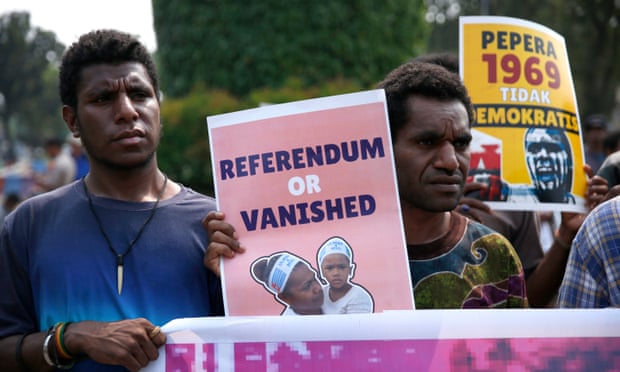https://www.theguardian.com/world/2019/aug/16/west-papua-pacific-leaders-urge-un-visit-to-regions-festering-human-rights-sore
Regional forum in Tuvalu ‘strongly encourages’ Indonesia to finalise UN visit to troubled province
Kate Lyons in Funafuti and Ben Doherty

West Papuan activists
Pacific leaders have urged the United Nations to inspect West Papua. Photograph: Adi Weda/EPA
The United Nations high commissioner for human rights should investigate the deteriorating human rights situation in West Papua within a year, Pacific nations have resolved, as independence protests in the province were quashed by police with widespread arrests and one leader described it as the “festering human rights sore of the region”.
Pacific leaders “strongly encouraged” Indonesia to finalise the timing of a visit by the UN high commissioner to investigate the reported human rights abuses – including torture, extrajudicial killings, and systemic police and military violence – so the commissioner could provide an “evidence-based, informed report” before next year’s Pacific Islands Forum.
The communique from this year’s forum, agreed to by leaders overnight in Tuvalu, “reaffirmed recognition of Indonesia’s sovereignty over West Papua”, but acknowledged “the reported escalation in violence and continued allegations of human rights abuses in West Papua”.
“Leaders called on all parties to protect and uphold the human rights of all residents and to work to address the root causes of the conflict by peaceful means. Further, leaders agreed to maintain open and constructive dialogue with Indonesia on the issue of alleged human rights abuses and violations in West Papua.”
Agreement on a visit to West Papua by the UN’s high commissioner for human rights was negotiated more than a year ago, but has never materialised, prompting a series of complaints from the UN. A request to visit remains outstanding.
A spokesman for Indonesia’s ministry of foreign affairs told The Guardian the invitation for the commissioner to visit West Papua “is still on the table”. Discussions between Jakarta and the high commissioner’s office on the timing of the visit are ongoing.
“This feels different,” exiled West Papuan independence leader Benny Wenda said of the PIF communique, attending the forum as part of Vanuatu’s delegation. “All the leaders now recognise the plea for the people of West Papua – that’s the main thing.”
“It’s a first step, and we welcome the leaders’ decisions, and I think, they cannot ignore this issue any more because it will never end; the human rights violations continue.”
Ralph Regenvanu, Vanuatu’s foreign minister, who was part of the drafting committee for the leaders’ communique, said Vanuatu had got all of the language they were hoping for in the communique.
“Hopefully [it will have] a big impact,” he said. “This is the festering human rights sore of our region and no one’s allowed in, so if what we ask for happens, it’ll be the first time the forum gets an objective view from the office of the UN human rights commissioner and we’ll be able to make a decision based on the informed view.”
Regenvanu said all nations in the group were supportive of the language, though had pushed for the addition of a line reaffirming the recognition of Indonesia’s sovereignty over West Papua.
Indonesia has consistently maintained its West Papua and Papua provinces are “purely internal affairs” outside the bailiwick of the PIF. Ahead of the forum, a spokesman told The Guardian, “no other country, organisation or individual has the right to interfere in them. We firmly oppose the intervention of Indonesia’s internal affairs in whatever form.”
In the past 24 hours, a series of demonstrations in West Papua and across other Indonesian provinces - planned to coincide with and the Pacific Islands Forum’s consideration of West Papua - were broken up early by police with mass arrests.
West Papuan sources say more than 100 people were arrested and detained across three protest sites across Jayapura, including a seven-year-old boy. Having been arrested in the morning, just as the demonstrations were beginning, most were held until nightfall. Some, however, remain in detention, sources say.
Photographs from demonstrations in Malang, in Java, and in Ambon, show bloodied protestors and large-scale arrests.
On Thursday, the anniversary of the 1962 New York Agreement between Indonesia and the Netherlands over the administration of West Papua, the Nduga Civil Society Coalition in Jakarta, released a report saying it had verified the deaths of 182 civilians - more than half of them children - who had died as a result of ongoing military operations and clashes between separatists and security forces over the past eight months.
At a press conference at Amnesty International’s Jakarta office, the coalition reported that at least 69 men, 21 women and 92 children had died between December 2018 and July this year. Many had died of hunger, the coalition said, while hiding in forests to avoid conflict-ridden villages and cities. Others were reportedly killed by security forces.
The Indonesian government said the death toll presented was a “hoax”. It puts the figure at 59.
